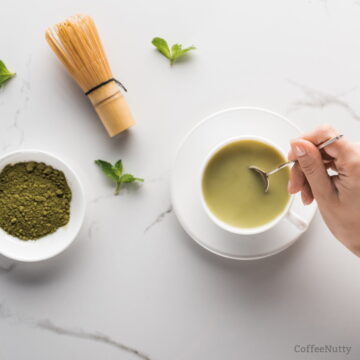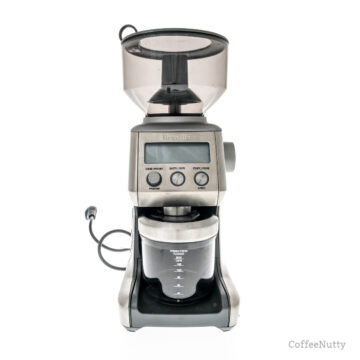It seems to be one of those guilty pleasures, drinking coffee creamer. Although it seems a bit weird to some people, others just can’t get enough. But recently, concerns have arisen about what this unusual choice of beverage may be doing to our health.
Drinking coffee creamer won’t kill you, but it can increase your risk for many health issues associated with the ingredients in creamers. For these reasons it is not safe to drink coffee creamer consistently in large amounts. It is recommended that you consume no more than three single-serve packets per day.

Now you may be wondering how much is too much. That question can only be answered by you. How much risk are you willing to take? Let’s take a look at those risks, so you can make an informed decision.
Is It Bad to Drink Coffee Creamer Plain?
A growing trend is drinking coffee creamer plain. By drinking it plain we mean opening those little packets of liquid creamer and drinking it all by itself. Some creamer addicts go for the huge bottles of creamer and pour a whole cupful. After all, it’s sweet and creamy; what’s not to love?
But now some consumers, particularly proponents of organic foods are starting to question whether this practice is okay from a health perspective.
Considering that coffee creamers are made primarily of
- Sugar
- Partially Hydrogenated Oils
- Thickeners
it can accurately be stated that they are not good for you. But it’s not likely that “Drinking Coffee Creamer” will be listed as the cause of death on your death certificate.
Even so, it is wise to assess the risk factors associated with these items for the sake of making informed choices.
Sugar Is A Killer
As previously noted, coffee creamers contain high levels of sugar, usually in the form of fructose. Sugar has been linked to:
- Obesity
- Heart Disease
- Cancer
- Liver Damage
- High Cholesterol Levels
- Tooth Decay
- Cognitive Decline
- Insulin Resistance
- Leptin Resistance
- Type II Diabetes
These facts alone should be enough to make us cautious about how much sugar is in our diet. Therefore, reducing sugar consumption may include restricting the amount of coffee creamer you enjoy daily.
That’s not to say you have to quit cold turkey, but it is a good idea to carefully regulate your sugar consumption in all food substances.
Partially Hydrogenated Oils Are Unhealthy
These oils are what used to be called “trans-fats”. Natural fats combined with metals produce a substance that is semi-solid at room temperature. Banned in some states, partially hydrogenated oils are associated with their own list of health risks, including:
- Increased HDL cholesterol
- Coronary Artery Disease
- Type II Diabetes
It should be clear that products containing these substances definitely will not add years to your life.
If you need help understanding what partially hydrogenated oils or trans-fats do to your arteries, think of the sludge at the bottom of your frying pan. That’s what is filling up your arteries.
And considering that your life is dependent upon your blood being able to flow freely through those arteries, I’m sure you understand the danger of letting things like trans-fats clog them up.
Thickeners Fire Things Up
Most nondairy coffee creamers are made with thickeners which are suspected of causing inflammation and even some digestive issues. Some doctors worry that these substances may lead to bowel obstruction which can be deadly, if not treated in time.
Other ingredients can include cellulose gum which comes from wood pulp or cotton, Polysorbate 60, sodium stearoyl lactate, and dipotassium phosphate. None of these are killers in themselves, but they can lead to or worsen other conditions.
Consume with Care
If you just must drink coffee creamer, it is recommended that you mix it half-and-half with milk. This will at least reduce the amount of sugar and trans-fats you absorb at one time. The cholesterol and sugar content of the milk may not improve the health ramifications much, but perhaps it will dilute the most damaging components somewhat.
Healthy Alternatives Exist
Now if you’re a coffee lover, you aren’t exactly thrilled to hear that your favorite creamer isn’t doing you any favors. It’s hard to imagine kicking off your day with anything besides a cup of joe laced with your favorite flavored creamer.
While we all want to live healthier, not all of us are prepared to give up things that have been part of a long-standing routine. But maybe you don’t have to give up everything you love.
There are several options that allow you to enjoy your morning cup of coffee while lessening the risks to your health.
Black Out Your Coffee
One choice is to go original and drink your coffee black.
The health benefits of coffee are a subject of continuing discussion with the verdict swinging from good to bad to okay. But one thing health experts seem to agree on is that black coffee is better for your health than coffee loaded down with chemicals and additives.
So, if you can’t give up coffee altogether, you have the option to drink it as nature intended it; black, and strong.
Heavy Cream Is an Option
If black is too strong for you, maybe using heavy cream would make it more palatable. Black coffee tends to be bitter. Cream can help mellow it out.
Dairy cream doesn’t have the added chemicals that nondairy creamers have. The sugar content is significantly lower than nondairy creamers, so the risks to your health are not as great.
It may take some time to adjust to the taste because your drink will not be as sweet as you are accustomed to. Over time, however, you will learn to like it just as much as you loved your sugar-laden coffee.
Coconut Oil Does the Trick
If heavy cream is not your cup of coffee, another option is coconut oil. Just a few drops of coconut oil will temper the strong, sometimes bitter taste of black coffee. The health benefits of coconut oil are well documented, so you can feel good about replacing your creamer with this natural oil.
Natural Sweeteners Are A Good Companion
If cream alone does not sweeten your coffee to your liking, you can add natural sweeteners to round out the taste.
Natural sweeteners have made waves in recent years as more people look for alternatives to refined sugar. Today there are several kinds of natural sweeteners on the market.
However, they are not all created equal. The discerning consumer must decide which natural sweetener best suits his needs and tastes.
Some of the most popular natural sweeteners include:
- Splenda
- Truvia
- Monk Fruit
- Stevia
Splenda Sweetens Well
There are two kinds of Splenda; the baking type which is a coarse powder, and the type to be used in beverages which typically comes in individual packets.
The baking type of Splenda can be used in beverages, but it doesn’t mix as well, so you’re likely to have little white blobs floating in the top of your coffee. If this doesn’t bother you, then it is quite suitable as the taste of the two doesn’t differ enough to be detectable.
Truvia Is an Excellent Choice
Truvia comes in the individual packets and is mostly intended to be used as a beverage sweetener. It works well and mixes with no residue left over. A couple of packets will sweeten your coffee as well as a teaspoon of sugar.
Monk Fruit Is A Different Story
This natural sweetener, although perfect for baking, is an absolute disaster for use as a beverage sweetener. It doesn’t take much of Monk Fruit Sweetener to produce a bitter, almost soapy taste. Not at all something you would want to drink first thing every morning.
Stevia Works Well
Stevia and Truvia are so similar one wonders if the only difference might be brand name. Like Splenda, Stevia does come in two forms: the coarse powder and the fine granule. The taste is so like that of Truvia, it is impossible to detect a difference between them.
Safe Is Not Always Best
While it is considered relatively safe to drink coffee creamer, those who worry about added chemicals and preservatives may feel safer limiting their consumption or avoiding creamer altogether.
RELATED:




